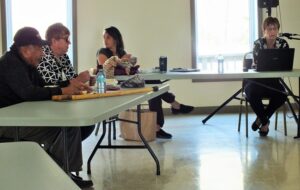Grandmothers and elders oppose proposed quarry

By Leslie Knibbs
SAGAMOK ANISHNAWBEK FIRST NATION — A small group of Grandmothers opposed to the establishment of a massive quarry attended an information session at the New Community Hall in Sagamok Anishnawbek First Nation on May 13.
Rhonda Kirby, a member of the Land and Water Defenders group (a coalition of Indigenous and non-Indigenous quarry opponents) gave a presentation explaining the current status of the proposed Darien Aggregates quarry in the Robinson Huron Treaty territory north of Lake Lauzon in Huron Shores Township.
The 115-hectare parcel of land for the proposed quarry was formerly zoned rural agricultural until the North Shore town council approved a zoning change in 2019 voting 3 to 2 in favour of rezoning the land from Restricted Open Space to Mineral Extraction. The proposed site includes wetlands and bush, which are the habitat of many land and water species, some of them endangered.
“Key concerns are [related to] the complex water management system that will be required for the lifetime of the quarry (120 years); impacts on wetlands, surrounding waterways, and the Serpent River Watershed,” stated Kirby.
The wetlands and surrounding forest are home to much wildlife as well as medicinal plants.
One major concern is the loss of moose aquatic feeding areas. Carol Shawana, a member of Serpent River First Nation, like others, is gravely concerned about the loss of fish and game.
“We rely on hunting and fishing and the moose will disappear,” she shared.
When the aquatic feeding areas are gone as a result of the quarry, the moose will move further north affecting the fall harvest, she believes.
Shawana says the area of the proposed quarry “is really everyone’s backyard.” Her main issues with the quarry include the water, driving the hunting further north, and the two tailing ponds from the uranium mining along the access road, an area where she is fearful the contaminated ponds will be disturbed with blasting at the quarry site. As well, she is deeply worried about the loss of medicinal plants and the species-at-risk wildlife in the area including the endangered Blanding’s Turtle. The area of the proposed quarry has the densest documented population of endangered Blanding’s Turtles in the province.
Shawana spoke of attending a community meeting in Serpent River with Rankin Construction, the key stakeholder in Darian Aggregates on March 25 this year. She remembers many questions were posed by community members, including Elders; however, according to Shawana, many of those questions went unanswered and several attendees had difficulties hearing the speakers.
TEK member Raymond Owl attended the meeting in Sagamok with his wife Janet. The Owls, along with the North Shore TEK group, have given their full support to those who oppose the quarry.
“As for myself, I am against it because the risks far outweigh the benefits in terms of what impact this quarry will have on the turtle habitat and all other bio-diversity to include humans, water, and plant life,” Jan Owl said following the meeting. “In my opinion, the stage is set to push as much paper around to look busy as possible. The application process to the permit is weak in accountability and responsible resource management.”
“… How can anyone say this will be vital to economic development to First Nations or municipalities of this area? I for one will never believe any promise made to restore the area after the 50 years has passed. That is mathematically insane,” she continued. “I ask how much will be too much? Nature at some point will buckle. This planet will fold in on itself because the banks are full, but life will be empty.”
Raymond Owl, a founding member of TEK, once told a representative from Eacom at a meeting on the spraying of glyphosate, “You are going to keep poisoning our lands, take everything you want then pack up your junk and move on. We have been here a long time and we will stay here after you are gone, but we are stuck with your mess left behind.” And this is perhaps the biggest worry of all who oppose the quarry.


